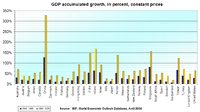
Photo from wikipedia
In theory, numerous factors affect the economic growth rate. This can be seen from the production function Y = f (Tp, C, L), where Y – GDP value, Tp –… Click to show full abstract
In theory, numerous factors affect the economic growth rate. This can be seen from the production function Y = f (Tp, C, L), where Y – GDP value, Tp – technological progress, C – capital, and L – labour. The impact of education, science, technological development, research and innovations on GDP growth is sublimated into technological progress. And vice versa, the stated fields affect technological progress through knowledge accumulation, as well as GDP growth as a consequence of growth in labour and equipment (capital) productivity. The era of globalization is accompanied by an intensive economic development, which has become some kind of social paradigm. Modern definitions and new developmental approaches are stressing multidisciplinary approach all the more, because together with the nominal GDP growth (aggregate or pc), there occur in the observed period social, structural and technological changes. Today, economic development also has to meet the requirement of sustainability, which most often involves ecological, energetic and other natural factors and norms. The phrase “sustainable development” represents to many people concern for the environment, even though the concept of sustainability is much more complex. It is not difficult to notice that there are more and more requests for smart, inclusive and sustainable growth, which assumes that GDP growth (Y) is occurring in a good (humane) social environment. And such an environment can only be realised by countries with developed institutions, including the policy of the entire education system. For example, the determinant “smart” is characterised by the processes of acquisition of new knowledge, even at lower educational levels, then studying, lifelong learning and other. EU member states have adopted the Europe 2020 strategy, through which they are applying the policy and standards of smart, sustainable and inclusive development. Thus, smart growth is a privilege of those countries that have developed education systems (David, Goldin and Katz, 2020; Hanushek and Woessmann, 2020a) and which invest in research, development and innovations (Visvizi, Lytras and Daniela, 2018; Hanushek, 2016). Likewise, inclusive growth depends on the quality and quantity of the education system, especially in primary, secondary and tertiary education. Kochetkov, Larionova and Vukovic (2017) argue that role of the university does not simply conduct R&D for business but creates essentially new industries and becomes the main actor Economic Implications of Education in Southeast Europe
Journal Title: International Journal of Cognitive Research in Science, Engineering and Education
Year Published: 2020
Link to full text (if available)
Share on Social Media: Sign Up to like & get
recommendations!